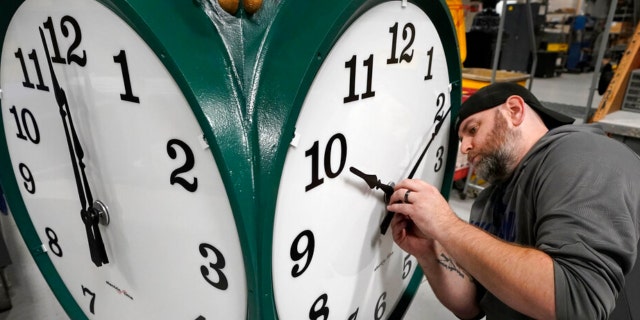NEWYou can now listen to Fox News articles!
“Better three hours too soon than one minute too late,” William Shakespeare, Act II, Scene 2, The Merry Wives of Windsor
Shakespeare may have worried about people showing up late.
But it’s a good thing he wasn’t clocking people arriving at the office Monday morning after the U.S. “sprung forward” by an hour to daylight saving time over the weekend. Everyone may have jumped forward an hour early Sunday morning. But it probably made everyone more than just a minute late for work or school on Monday morning.
If the Bard worried about timeliness, he may have abhorred America’s biannual, temporal switch. For instance, Richard III might complain because at this time of year, he’d be “Richard IV.” He’d then revert to Richard III in the fall.
Hamlet might embrace the time switcheroo. Consider Hamlet’s “to be or not to be” soliloquy. Hamlet could actually have it both ways, thanks to the time switch. The Prince of Denmark could “be” when we fall back. And then “not to be” when the clocks jump forward in March.
Scott Gow adjusts a tower clock on test at the Electric Time Company
(REUTERS/Brian Snyder )
BAD TICKER: DOES DAYLIGHT SAVING TIME CAUSE ‘BIOLOGICAL CLOCK SHOCK’ TO YOUR HEART?
Shakespeare may have declared “time is eternal” for “those who love.” But Congress has started noticing how little Americans love the time change. Especially when we lose an hour. That’s why the House Commerce Committee held a hearing recently on the time switching.
Congress is struggling to account for the trillions in COVID aid it doled out in 2020 and 2021. It’s unclear how well lawmakers will account for the hour we lose each spring.
“Time’s thievish progress to eternity,” wrote Shakespeare in Sonnet 77.
But Shakespeare’s real grievance about losing that hour isn’t with time itself. He should direct his ire at Congress.
After all, Congress is the culprit behind all of spasmodic time shifting.

Search queries for ‘watch collection display’ were up 65% in 2021 and Pinterest believes the trend will continue to grow in 2022.
(iStock)
Congress approved “The Calder Act” during World War I. The idea was to spring clocks ahead to match the sun and conserve fuel. But the time measure wasn’t popular. Congress later approved a bill to end daylight saving time. President Woodrow Wilson vetoed the legislation. But then something extraordinary happened. Congress has only executed 112 successful veto overrides in the history of the republic. One of them was over daylight saving time. Yep. Congress overrode Wilson’s veto, and time was up for daylight saving time.
President Franklin Delano Roosevelt sprung clocks ahead by an hour for “War Time” during World War II. But clocks reverted to their old settings after the war.
Congress approved the Uniform Time Act in 1966. It solidified the boundaries of the four “time zones” within the U.S. It also declared that the U.S. would shift to daylight saving time on the last Sunday in April. The country would revert to standard time on the last Sunday in October.
The U.S switched clocks ahead for nearly two years when OPEC slashed production, prompting the oil shocks of the 1970s. Lawmakers then updated the law in 1986, changing when the country would move between daylight saving time and standard time. A 2005 energy bill condensed the period the country dwells one standard time. In fact, daylight saving time is no more standard in the U.S. than “standard time” anymore. U.S. clocks spin to daylight saving time for about eight months out of the year compared to just four months on standard time.
It’s just twice a year. But it seems like we change the clocks more often than Tom Brady retires and un-retires.
Rarely does a month go by without spotting a clock that still operates on the old system and never switched over. Clocks in public places are often like this. It’s kind of like the old expression: Even a broken clock is right twice a day. In these instances, a broken clock is only right for a few months out of every year.
This is why the House Energy and Commerce Committee’s subcommittee on consumer protection conducted a hearing to probe problems prompted by the time change. Traffic accidents increase. Heart attacks spike. There’s sleep deprivation. Most sleep experts advocate the nation adopting one time or another year-round to match the body’s circadian rhythms.
DAYLIGHT SAVING TIME: WHEN AND WHY WE ‘FALL BACK’
Committee Chairman Frank Pallone, D-N.J., says he’s undecided as to which is better: standard time or daylight saving time. Pallone just wants the U.S. to pick one or the other.
Sens. Marco Rubio, R-Fla., and Patty Murray, D-Wash., crafted a bill two years go to permanently shift the U.S. on daylight saving time. Former President Trump even backed a similar proposal when he was in office.
States can opt out of daylight saving time. That’s why dozens of state legislatures are considering the issue now. But it’s up to Congress to establish a national time standard. The Constitution granted Congress the power to determine such things. Article I, Section 8 of the Constitution permits Congress to “coin money” and also “fix the Standard of Weights and Measures.”
That includes setting the time.
So, perhaps the time has come to change the time. This may be the deepest lawmakers have sunk themselves into the politics of time since passage of the Uniform Time Act — or maybe the veto override of President Wilson.
“Time is very a bankrupt,” wrote Shakespeare in Act IV, Scene 2 of The Comedy of Errors. “Have you not heard men say That Time comes stealing on by night and day?”
But it’s not time that purloins that hour every spring. It’s the responsibility of Congress. At least we get the hour back in the fall. That’s kind of like the arcane, Congressional budget reconciliation rules. A bill considered under budget reconciliation can’t add to the deficit. Apparently, Congress feels the same way about time. That’s why the hours have to eventually even out.

Clock technician Dan LaMoore adjusts clock hands on a large outdoor clock
((AP Photo/Steven Senne))
Still, it’s doubtful Congress will act any time soon on time legislation.
Perhaps lawmakers are operating on what Shakespeare would have called a “Shrewsbury clock.”
In Act V, Scene 4 of Henry IV, John Falstaff proclaims he was subject to “a long hour by Shrewsbury clock.” In other words, Falstaff found an inaccurate clock that seemed to tick very slowly.
That could apply to much of what Congress does anyway.
Procrastinators often say they can’t do something because the time isn’t right.
CLICK HERE TO GET THE FOX NEWS APP
In the case of Congress, that could be both an excuse. And a justification.